Tuesday Triage #68
- TUESDAY TRIAGE #68 by Vadim Drobinin
- On traveling through food
- Things I enjoyed reading
- 1. How the Maestro Got His Hands Back by Gabriella Paiella
- 2. To Each According To Their Salary? by Oliver Styles
- 3. The company man by Stephen Marche
- 4. Introduction to Keywords via Understanding Searcher Psychology by @daedtech
- 5. What's your passion? by @tinkeredthinker
- 6. The Married Will Soon Be the Minority by Charles M. Blow
- 7. Human History Gets a Rewrite by William Deresiewicz
- 8. Open secrets about Hacker News by @bengtanAU
- 9. What Prehistoric Cave Paintings Reveal About Early Human Life by @MsBeckyLittle
- 10. Spear phishing with Slackbot for fun and profit by @ericwbailey
- Things I didn't know last Tuesday
- 1. Lahpet
- 2. Title of czar comes from Caesar
- 3. Mote Spoon
- 4. Dujiangyan Zhongshuge Bookstore in Sichuan
- 5. Redhead living in the Tower of London
- 6. Silica beads are not toxic
- 7. Corned beef is named after "corns" of salt
- 8. Tristan da Cunha
- 9. Cicchetti
- 10. Someone won a night in Rijksmuseum
- Book of the week
- Thank you and see you in a week!
TUESDAY TRIAGE #68
by Vadim Drobinin ¶
Your weekly crème de la crème of the Internet is here!
02.11.2021 (read in browser)
-
Intro
Whatever is on my mind this week. -
Things I enjoyed reading
Ten-ish articles I found worth reading. -
Things I didn't know last Tuesday
Ten-ish facts I didn't know when I wrote the previous edition. -
Book of the week
Some thoughts on the latest book I've read.
Yeah, I am sending it out 24 later than usual: that's the Italian weather to blame, although now I bear an important skill of walking through security with five litres of alcohol in hand luggage. Pro-tip: get your flight diverted to another airport, then tell that you can't leave the country without your share of amari.
On traveling through food ¶
This week we’re back to Italy, and are staying in the same city for the whole duration of the trip (probably for the first time in years, as usually we tend to jump between cities on every single excuse).
The city of the choice is Florence, and despite not being able to travel around across the vineyards (the grapes were harvested a few months ago), seems like even a single city could tell a lot.
I am not a huge fan of museums, and despite the city’s history not a huge fan of art either, but I love good food and apparently among Italian cities Florence is particularly famous for its cuisine.
Here are a few examples in no particular order:
Panino di lampredotto: cow’s stomach boiled with spices, and then thinly sliced to order. The top part of the bun is dipped into the broth, while the meat is covered with a mix of sauces.
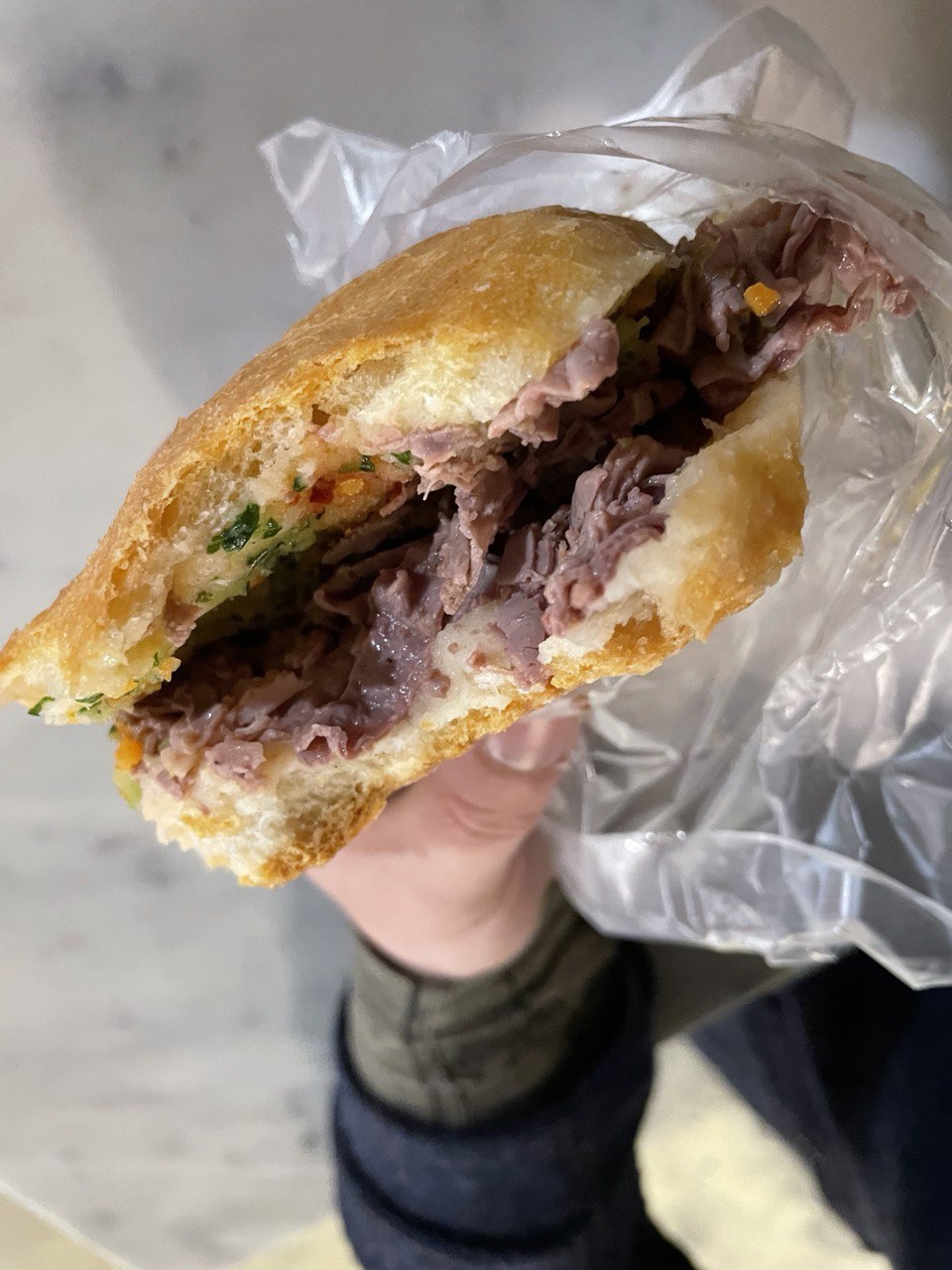
Beef tartare with amaranth pop-corn: an unusual twist on the classics, and yet a delicious one. We had more tartare steaks while in Italy, but this one was exceptional:
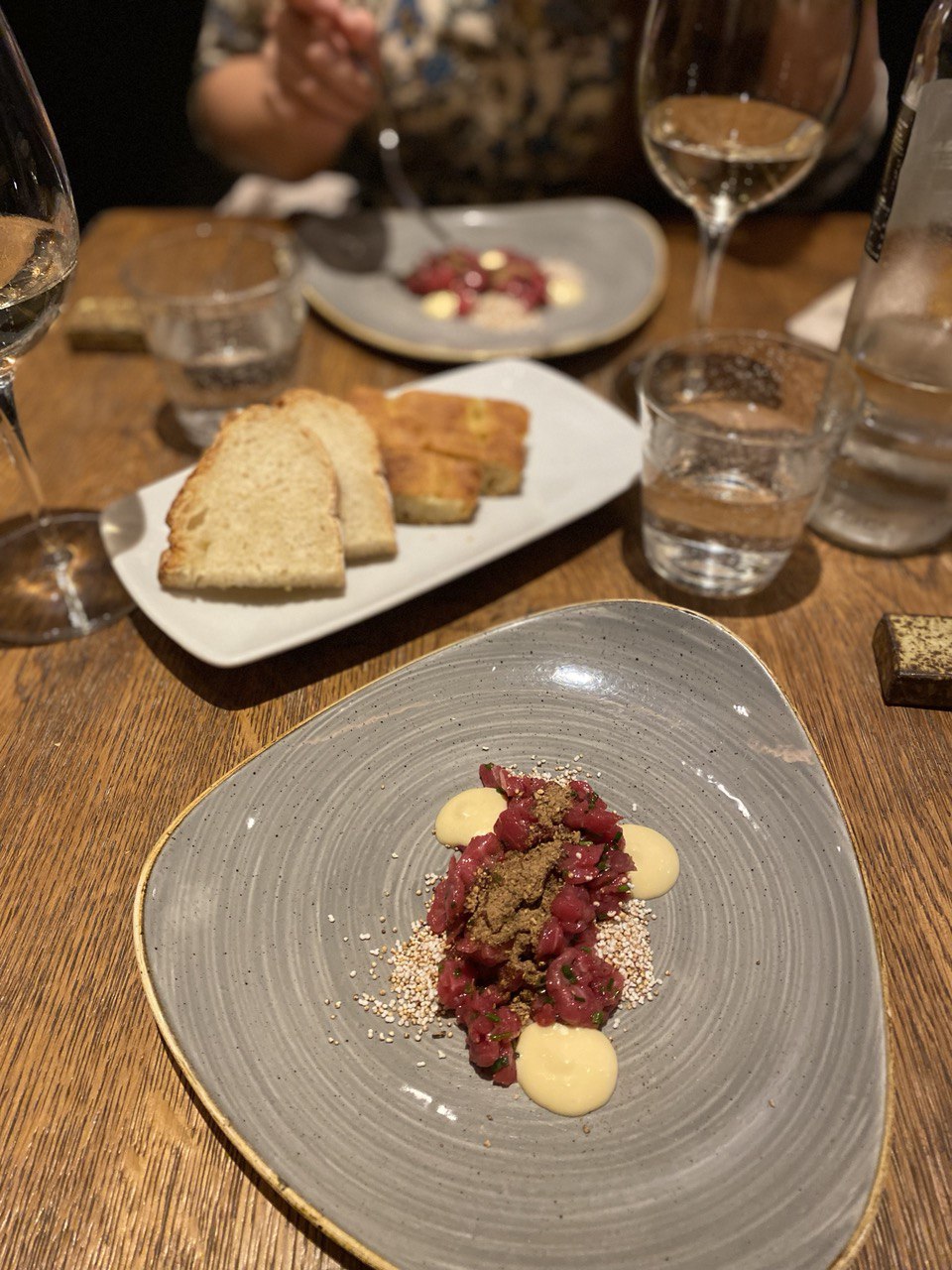
A very simple dish — ravioli with pheasant, topped with onion and blueberry compotes — but still one of the best pasta dishes I ever had.
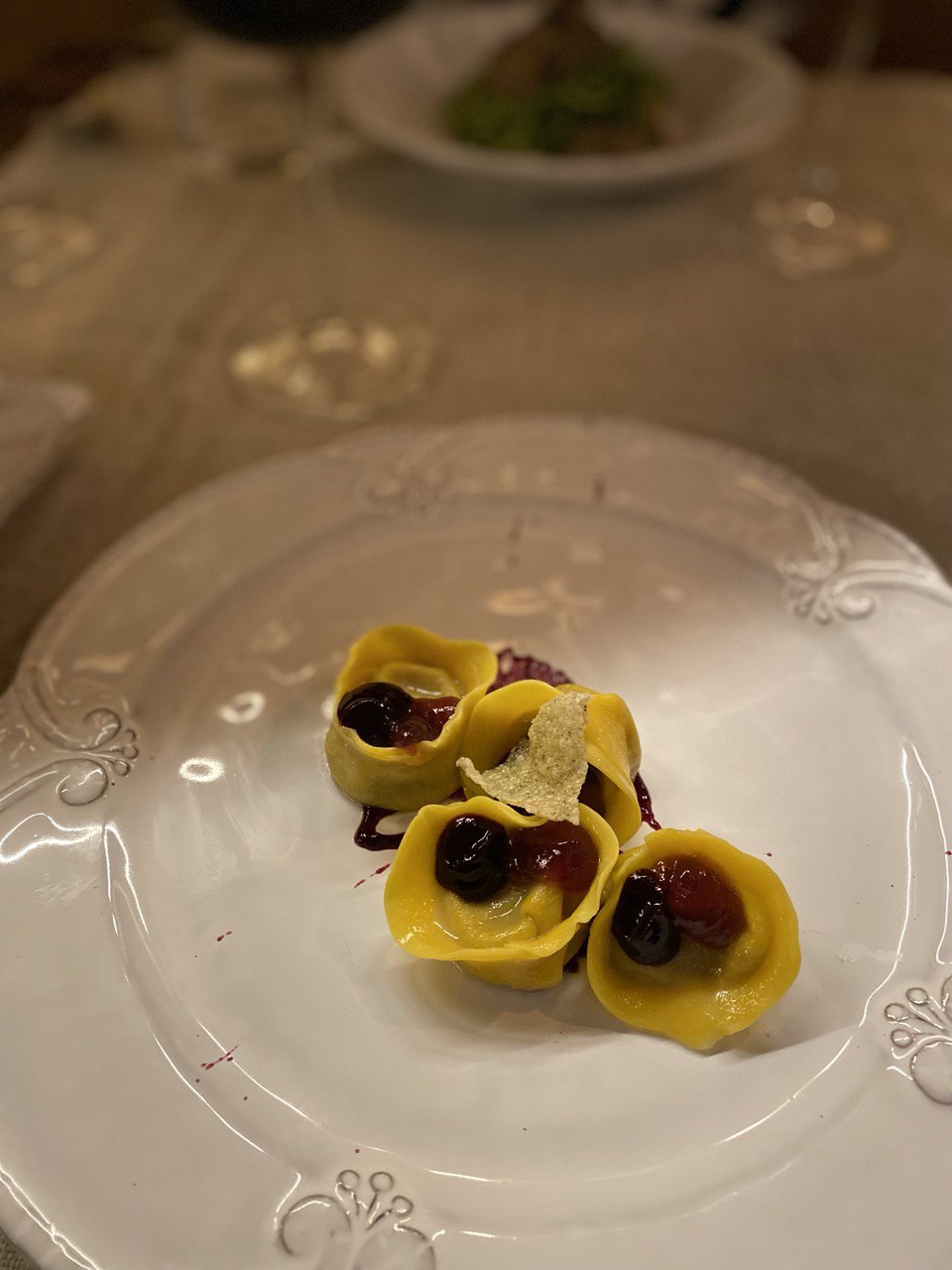
We’ve stumbled upon a restaurant mixing Japanese classics with local ingredients, and while everything was cooked to perfection and plated straight away, my favourite was the soy sauce-based caramel on top of this pana cotta:
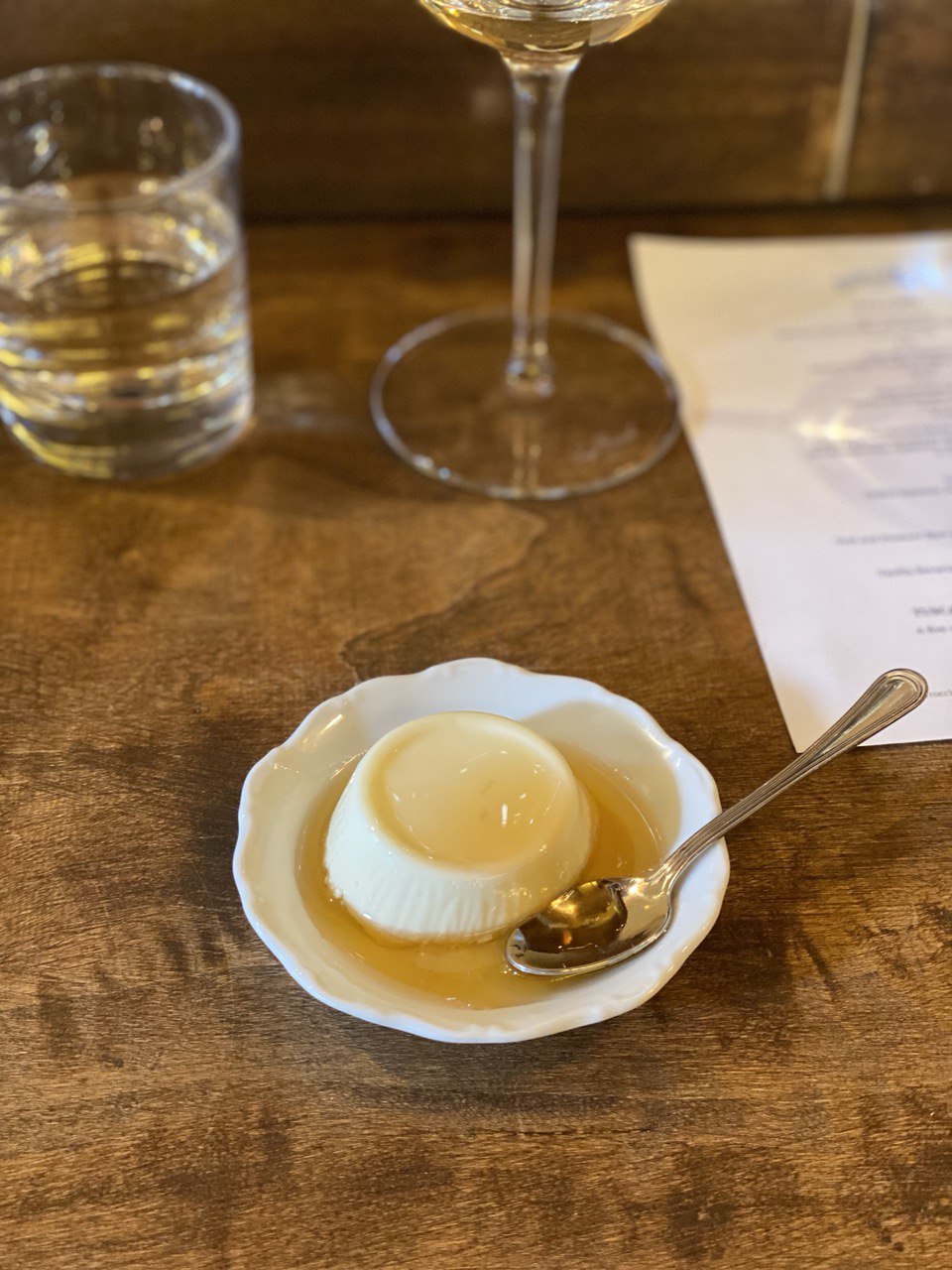
While I wouldn’t have this dish often (or even again), the raspberries, sage, and risotto are a great (albeit unexpected) combination:
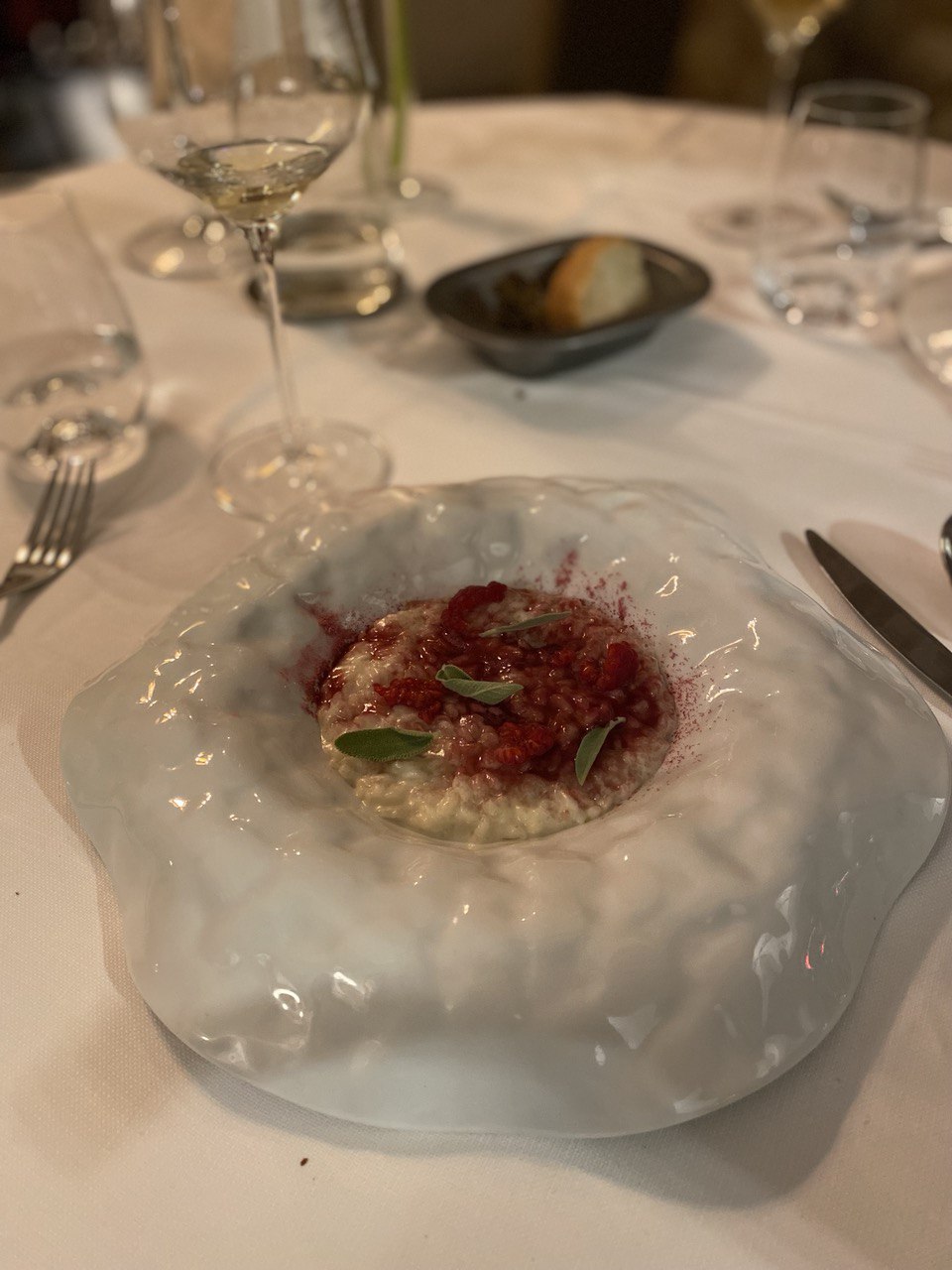
And obviously we couldn’t miss the pinnacle of local cuisine — the Bistecca alla Fiorentina. My first introduction to it was back in Milan, maybe six years ago or even more, and ever since it wasn’t much of a difference to grill and home. That being said, it was nice to have it right here.
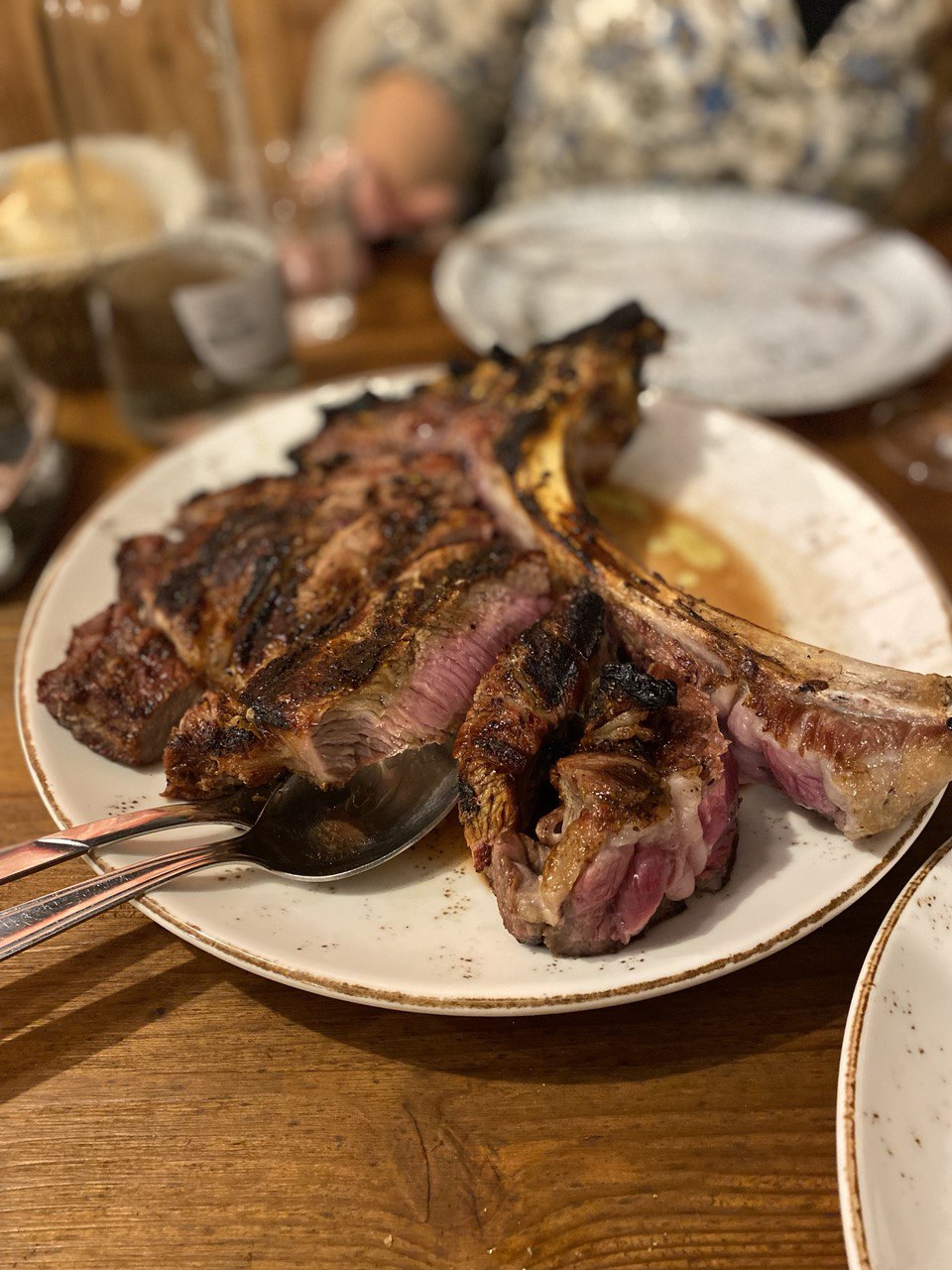
Traveling through food is way more entertaining than through tour guides and package holidays. It’s also a nice way to explore the city without sticking to the city centre as good chefs tend to live among locals more often than not,
And last but not least, that’s where the comfort zone gets expanded: local recipes don’t care if you never tried cow’s stomach or pickled cactus, they just exist.
On that note, without further ado,
Things I enjoyed reading ¶
1. How the Maestro Got His Hands Back by Gabriella Paiella ¶
A very inspirational piece on pursuing one's passion through every possible misfortune, including losing hands while dreaming of playing a piano.
If you'll spare me a moment, I want you to think about your greatest passion. Maybe it's painting or long-distance running or beekeeping. Hell, I don't know, windsurfing. Now ask yourself: To what excruciating lengths would you go to keep doing it, even if all the forces in the universe seemed to be conspiring against you, since before you were even born? Most passions don't pay the bills. Even when they do, they can end up warped and demystified. Tedious. It can become easy to forget why you love doing what you do in the first place.
Even though building mobile apps is a bit different from engineering bionic gloves, there are people whose life changes as well, and every story like this one is a great aid at bring more people to the industry, which has its own pros and cons but is probably one of the most influential out there if you care about a real impact at others' lives.
2. To Each According To Their Salary? by Oliver Styles ¶
As someone who got a chance to interact with winemakers, grape pickers and someliers (this year way more than expected!), I can second pretty much whole post on how wine prices do not reflect its real value anymore. Most of the demand is pretty much artificial: people buy bottles not that many got a chance to taste, or auction cases never opened before, but it doesn't really describe the state of the union as a whole.
To return to maximum pricing, I’ve argued that wine, as a cultural object (like art or music), should be priced like CDs – all broadly the same. You don’t pay more for Shostakovich than you do for Vaughan Williams. Maybe we could have a Spotify-style wine subscription service in which we pay a monthly subscription fee to a Scandinavian firm and, every month, we get to choose the contents of an unlimited, mixed 12-pack? Supply and demand would potentially be an issue (although perhaps less than many might argue – honestly, where do you begin to make a weekly 12-bottle selection?), but if it is, working out how best to apportion the in-demand wines outside of financial considerations would be a liberating exercise. It would make a change from implying the well-off appreciate wine the best.
One way would be to stop voting with your wallet for mass-market production of mediocre orange wine and "organic" clean bottles from famous actors, as it dilutes the market and forces small wineries to inflate their prices in order to compete for labor and attention.
3. The company man by Stephen Marche ¶
A yet another detective story about modern criminals, which is brilliant in the sence that the main character became a drug lord not by murdering and torturing, but by reducing costs and optimising logistics, so basically applying the university curriculum to selling heroin.
What gave traditional organized crime its strength in the past—the violence, the control of territory, the ethnic loyalty and defined hierarchies—are the heart of its weakness in the present. Tse had a better system. Instead of ethnic loyalty, transnational and inter-organizational co-operation. Instead of territory, logistics. Instead of hierarchy, metrics. Instead of centralized control, connections. Tse Chi Lop is easily the most significant criminal in Toronto’s history, and he represents, in an entirely diseased way, a perverse triumph of the city. His vast criminal organization flourished through open-mindedness and entrepreneurship, by creating markets and exploiting them in a spirit of eager globalization and cosmopolitanism. He is one of capitalism’s grandest and most polite monsters. He is very much one of us.
So in the end he managed to build a kind of Amazon with guaranteed delivery. Also the story peaks into how the modern law enforcement operates (and will continue operating): by mostly sticking to researching phone contents.
4. Introduction to Keywords via Understanding Searcher Psychology by @daedtech ¶
Wish I had something similar back then, trying to build keywords for one of my first websites with food recipes, as this is a great walkthrough of the modern approaches to understanding how people find answers in the Internet.
People with specific, tactical questions are ruthless with their attention. Anyone googling “garlic chicken recipe” does NOT want to read a long backstory about you cooking with your grandmother. And anyone googling “programming books” does NOT want to read about your opinions about the industry.
As someone who worked for a company trying to fix exactly that, I can't relate more.
5. What's your passion? by @tinkeredthinker ¶
One of the red flags in a job description for me is the word "passionate".
In the contrary to the first today's link, passion at work rarely helps.
As an engineer, I want to work with dispationate engineers – the ones who never grow attached to their code or ready to acknowledge mistakes – not the ones thinking that the app with millions users is their playground.
Curiosity carries no serious commitment of identity. The concept is far more childlike, full of wonder, unafraid of mistakes, and wide-ranging. It is the opposite of the way that the word passion is limiting. If one’s ‘passion’ is a well defined box, curiosity is like a spot-light that wheels around and looks in all sorts of directions. But it lacks that comforting certainty, and that – I’m willing to bet – is why curiosity gets pushed aside by the grand idea of ‘a passion’.
Curiosity, however, is vitaly important. An engineer can't evolve without being curious, and this is something that's very hard to teach.
6. The Married Will Soon Be the Minority by Charles M. Blow ¶
An interesting opinion on the state of the marriages in the States:
We are nearing a time when there will be more unmarried adults in the United States than married ones, a development with enormous consequences for how we define family and adulthood in general, as well as how we structure taxation and benefits.
It's also an opinion I don't really agree with, even though arguing with numbers is pretty pointless.
7. Human History Gets a Rewrite by William Deresiewicz ¶
One of a very few book reviews I enjoyed reading way more than I would reading the book itself:
The overriding point is that hunter-gatherers made choices—conscious, deliberate, collective—about the ways that they wanted to organize their societies: to apportion work, dispose of wealth, distribute power. In other words, they practiced politics. Some of them experimented with agriculture and decided that it wasn’t worth the cost. Others looked at their neighbors and determined to live as differently as possible—a process that Graeber and Wengrow describe in detail with respect to the Indigenous peoples of Northern California, “puritans” who idealized thrift, simplicity, money, and work, in contrast to the ostentatious slaveholding chieftains of the Pacific Northwest.
Most historic books tend to picture the BC-era society as very primitive, which is far from the truth, and the history of humanity on its own is way more entertaining than when it's a part of a middle school course.
8. Open secrets about Hacker News by @bengtanAU ¶
Probably for the first time in quite a few years I understand how works the website I use pretty much daily (and what does it say about my curiosity?). Hacker News is to blame for most of links in this newsletter, one way or another, as it gives writers a boost strong enough to eventually show up in one of my feeds, but I never thought how complex is their voting system (even though I managed to land on the front page a few times).
A newly submitted story will get around 30 page views from being listed in the Sandbox (The actual number varies so let’s just talk about averages). All stories start with one point. If it gets 4 additional upvotes, it will escape the Sandbox.
In other words, the story must persuade 13.3% or more of readers to upvote. That’s a pretty high conversion rate.
Sounds like a recognition, not going to lie.
9. What Prehistoric Cave Paintings Reveal About Early Human Life by @MsBeckyLittle ¶
Circling back to the point of the history of humanity, here is a fresh look into language development based on cave paintings (which apparently are older than I though; like way older than I thought).
The Lasacaux cave art contains something like a “unicorn”—a horned, horse-like animal that may or may not be pregnant. Another unique image has variously been interpreted as a hunting accident in which a bison and a man both die, or an image involving a sorcerer or wizard. In any case, the artist seems to have paid particular attention to making the human figure anatomically male.
Even from a small piece on a wall scientists manage to reconstruct stories and events, can't really complain about being forced to deduct Tolstoy's mood from the way he described curtains back at school.
10. Spear phishing with Slackbot for fun and profit by @ericwbailey ¶
Spear phishing attacks are probably the most common, simple to implement, and yet also the most effective out there. It's as simple as pretending to be something or someone else, whether it's a user's IT administrator, or a Slack bot, and the author shows a great example of how it could be done in a matter of minutes.
We need to think like monsters in order to prevent harm. By facilitating difficult conversations about how features can be misused, we can reduce the damage our products create.
This is one of my favourite types of security research posts, as while the issue itself is more of a UX problem than an engineering bug, there are a few ways we as engineers could address it for the sake of users' security.
Things I didn't know last Tuesday ¶
1. Lahpet ¶
I don't really understand tea, but seems like there is at least one country in the world where they love it so much they not only drink it.
Myanmar is one of the few countries where tea is both consumed as a drink and as an eaten delicacy, in the form of pickled tea, which is unique to this region. Laphet is regarded as a national delicacy that plays a significant role in Burmese society, and remains a traditional Burmese gesture of hospitality and is served to guests visiting a home.
To be fair, I've seen pickled bamboo leaves and garlic, and then there are pickled sausages as well, so a tea leave doesn't even sound bad.
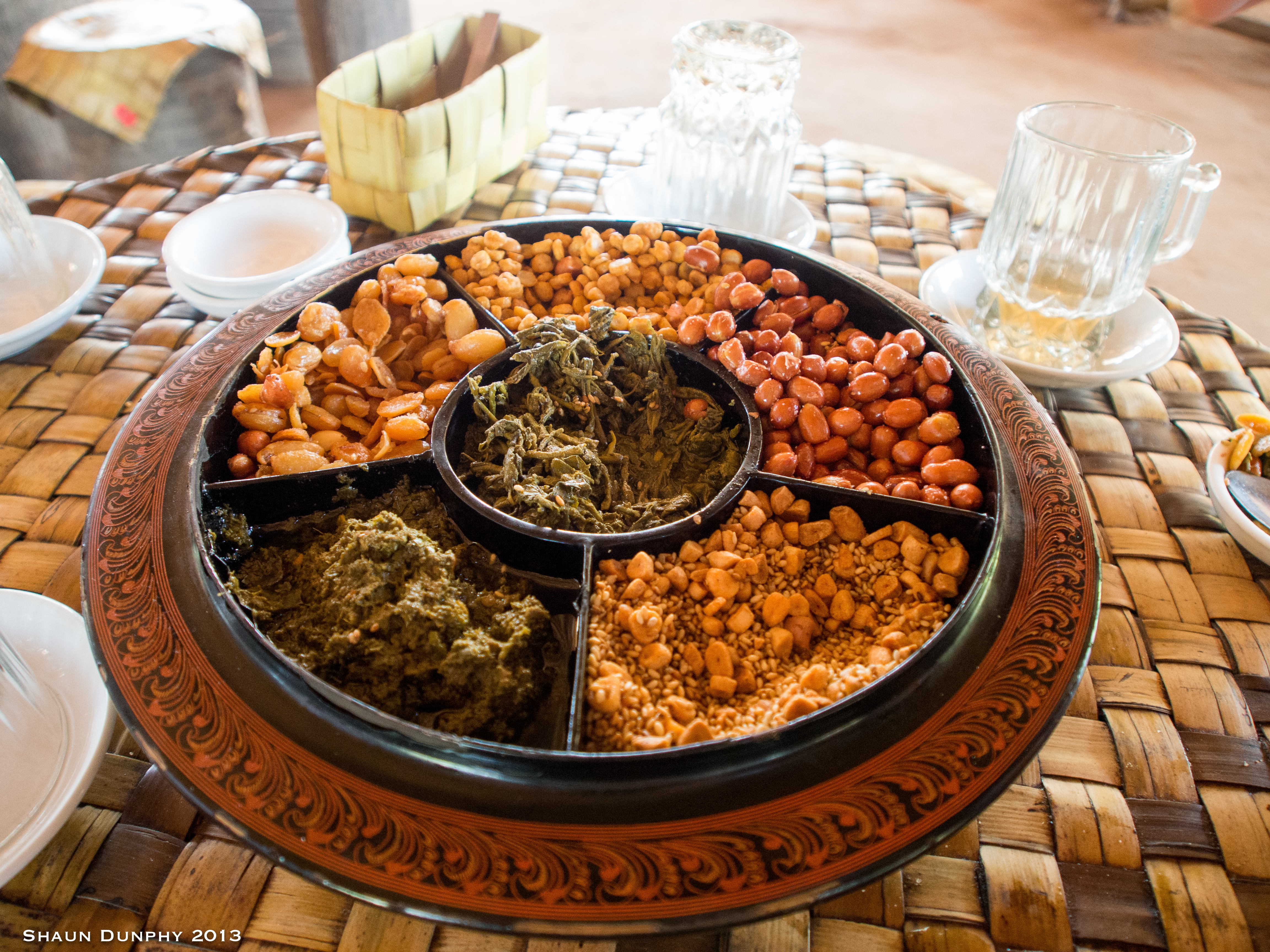
2. Title of czar comes from Caesar ¶
The two words always looked similar to me, but it's pretty cool to see the actual confirmation: they have the same root and come from the verb “caedo” or “to cut".
Originally the title “czar” was derived from the word Caesar and meant a ruler who was looked upon as claiming the same rank as a Roman emperor. “Tsar,” another spelling, was used as that of the supreme ruler of Bulgaria from 913-1018, 1185-1422 and 1908-1986. In Serbia that term was in use from 1346-1371 and in Russia from 1547-1721, but remained in common usage politically until 1917.
I think the only time I personally use "czar" is when referring to Peter the Great (which I do surprisingly often), but apparently it is also common in the States when speaking about some government officials.
3. Mote Spoon ¶
Here is another tea trivia: a special kind of slotted spoon was invented on purpose to work as a fancy filter.
Traditionally, tea was made by adding loose tea leaves to a teapot of hot water. When the brewed tea was poured from the teapot it would not be uncommon for some stray tea leaves to enter the tea cup.
For this unruly situation, having a mote spoon handy on the table in preparation was the common practise. The slots in the mote spoon would allow the tea leaves to be removed with a simple scoop.
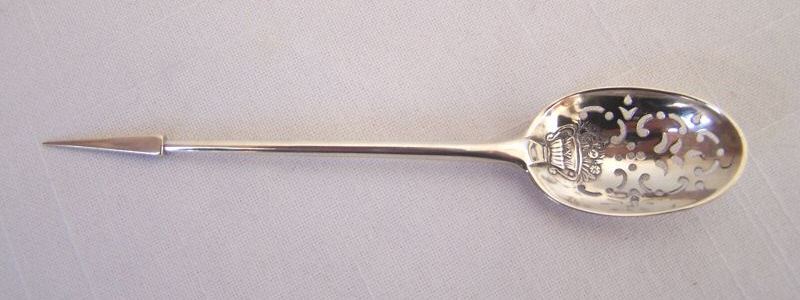
I did my best trying to find if it eventually inspired absinthe spoons but seems like it was completely independent.
4. Dujiangyan Zhongshuge Bookstore in Sichuan ¶
Must be the most beautiful bookstore I've ever seen (although so far only online).
Those tiles, and the 80,000 books sold here, are the only straight lines to be found in the more than 10,000sq ft space: the layered design, described by many as “surreal”, consists of curved staircases and walnut bookshelves, round columns and arched doorways, all magnified and multiplied by a mirrored ceiling.
 (image from www.urdesignmag.com)
(image from www.urdesignmag.com)
The only disappointing bit is that the ceiling is a mirror, so there are less books than you think on the first sight.
5. Redhead living in the Tower of London ¶
Apparently there is a bunch of people living within the Tower walls, and people claim that one of them looks like a Disney princess.
Megan moved into a family apartment in the eastern wall of the Tower last summer with her father, Chris, who is one of 32 Yeomen Warders (Beefeaters) living within the ancient walls.
Must be a really creepy encounter if you walk past the bridge in the middle of a night and see someone through the window.
6. Silica beads are not toxic ¶
I never considered eating silica gel packages, but I never thought they are edible either. Apparently eating them is not dangerous, and now I am not sure what to do with that knowledge.
Although the packages say, “Do not eat,” they aren’t actually toxic. They are filled with little silicon dioxide beads, and the only real danger associated with them is that they could pose a choking hazard for young children.
This was a yet another childhood myth being debunked.
7. Corned beef is named after "corns" of salt ¶
Another thing I never questioned is where the name of the corned beef comes from. Apparently it's just crystals of salt.
The term comes from the treatment of the meat with large-grained rock salt, also called "corns" of salt. Sometimes, sugar and spices are added to corned beef recipes. Corned beef is featured as an ingredient in many cuisines.
To be fair, for a very long time I thought it has something to do with corn (like they use it in the recipe or something).
8. Tristan da Cunha ¶
Imagine an island so remote, they manage to learn about the World War I only after it ended.
Not a single ship visited Tristan da Cunha from 1909 until 1919, until the HMS Yarmouth finally stopped by to inform the islanders of the outcome of World War I.
These days they seem to have an Internet cafe and a few hundreds of people, although mobile network doesn't seem to be a thing as it happened to be too unreliable and expensive (at least based on blog posts from 2016).
9. Cicchetti ¶
Think tapas but Italian:
Small snacks or side dishes, typically served in traditional "bàcari" (cicchetti bars or osterie) in Venice, Italy [...]
Cicchetti are usually accompanied by a small glass of local white wine, which the locals refer to as an "ombra" (shadow).
One of the most enjoyable aspects of Venetian social life is contained in the phrase: "Let’s go to drink a shadow" (Venetian “Andémo béver un'ombra”). This is an invitation to go for a drink, and more exactly a small glass of wine (a "shadow"), which is typically drunk in one shot.
I am kind of disappointed we've tried them in Florence, not Venice:
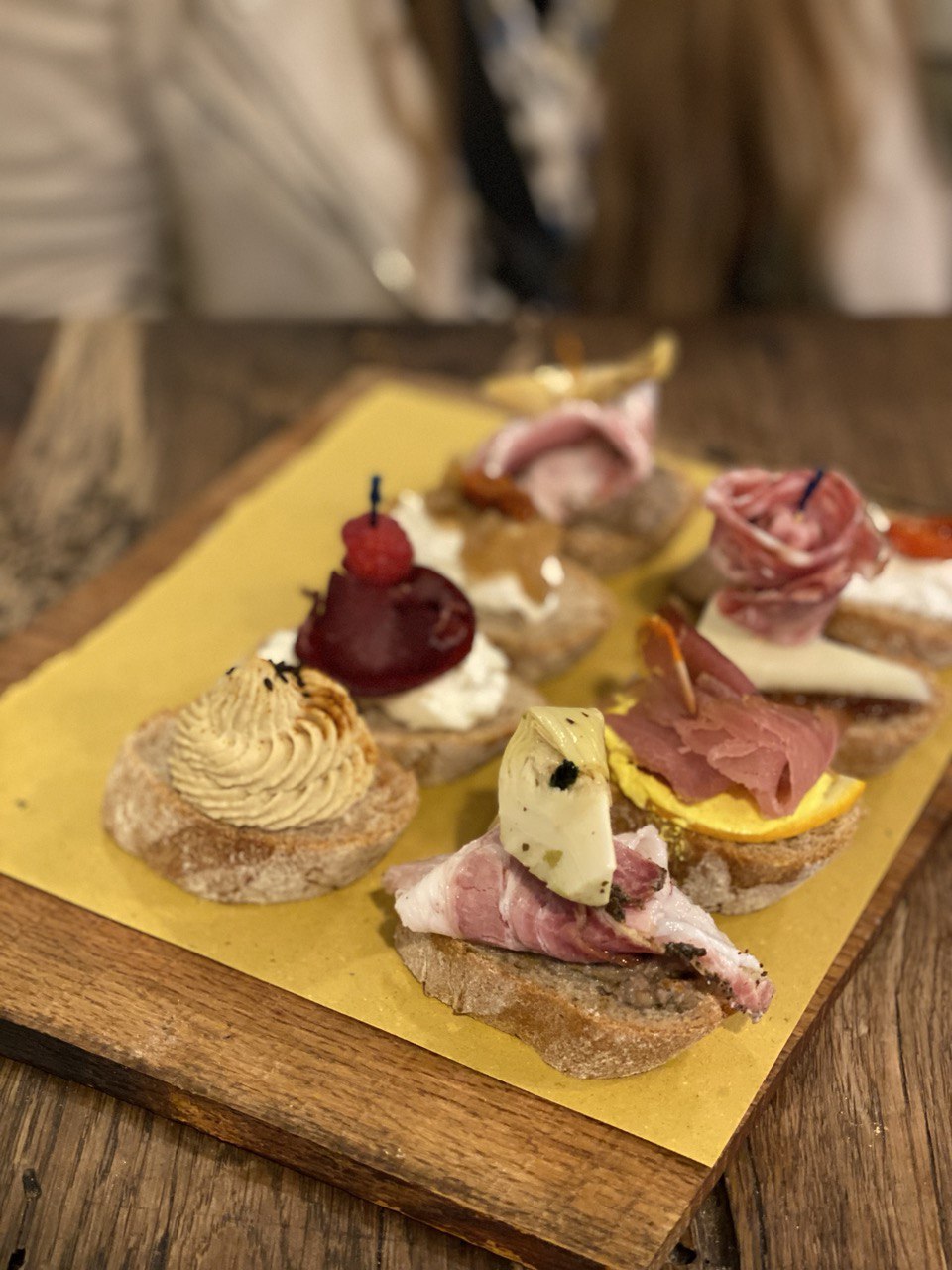
But they were delicious anyway, and Venice wasn't too far, so it still counts, isn't it?
10. Someone won a night in Rijksmuseum ¶
If you think your lottery prizes are not good enough, here is a school teacher who went with kids to a museum and ended up sleeping inside and getting a private tour around.
Stefan Kasper became the first person, apart from the odd security guard, to spend a night alone with Rembrandt's masterpiece at Amsterdam's world famous Rijksmuseum this week.
And all Mr Kasper had to do to win the amazing prize was be the 10 millionth visitor to the museum since its reopening in 2013.
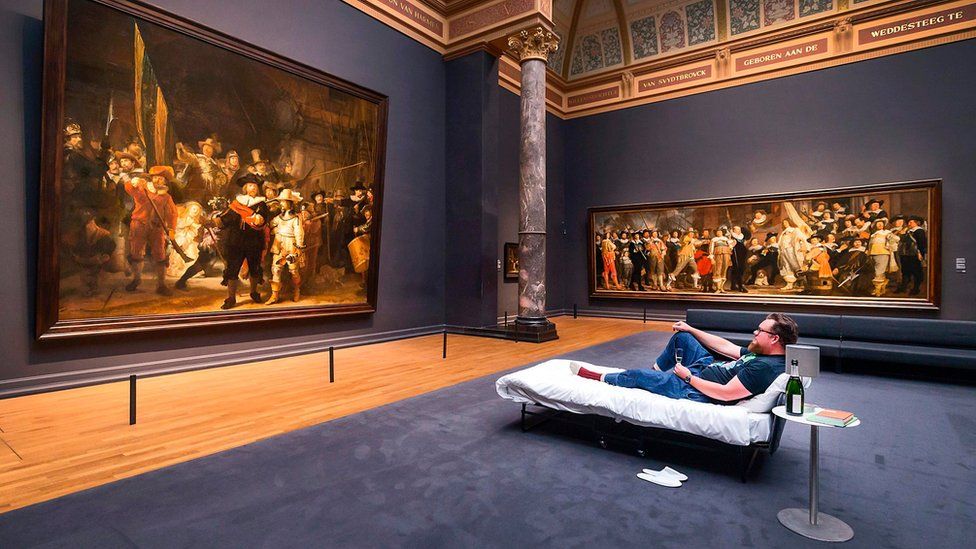 (image from bbc.com)
(image from bbc.com)
I am kind of not surprised that it happened in Amsterdam, as I can't imagine pretty much any other country where it'd work as-is: without guards and with such a clever marketing campaign.
Book of the week ¶
While away from England, what could be better than reading through its history in a nutshell (yeah, many things)?
So to avoid missing the country for these short five days holiday I picked up James Hawes's The Shortest History of England spotted in the airport:
The English were ready to become theatre-lovers. With their age-old religious art, rites and popular celebrations now forbidden, they had become used to listening very carefully to the spoken Word, even if they only half-understood things (getting it right might be life or death). Thomas Cromwell had established the stage as the one place where colour, noise and spectacle were still allowed – though only in the service of teaching supposed national history. And in the post-Armada rush of unity, the high and low of England were ready, for the first time since the Conquest, to mix in the same public spaces.
This allowed Shakespeare to tread the linguistic tightrope of the English language, and talk for once to everybody.
I am not a huge fan of history, and even my recent obsession with autobiographies is driven purely by anecdotes they tell, not the historical lessons to learn from. However, there are lots of things in day to day life I fail to understand, one of which is how a tiny island across the sea managed to regulate the price of tea.
The book seems to succeed in explaining it, and many more, in a relatively easy to consume matter (I've fallen asleep only once so far, but that was a tough day).
Thank you and see you in a week! ¶
If you have any questions, or want to suggest a link for the next newsletter, please drop me a message on Twitter or reply to this email.
Cheers! 🍸